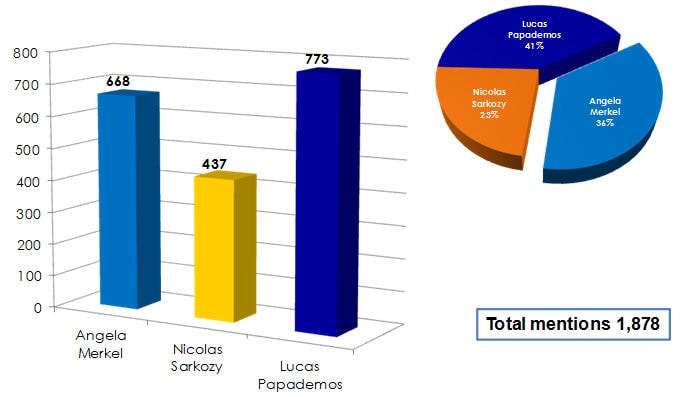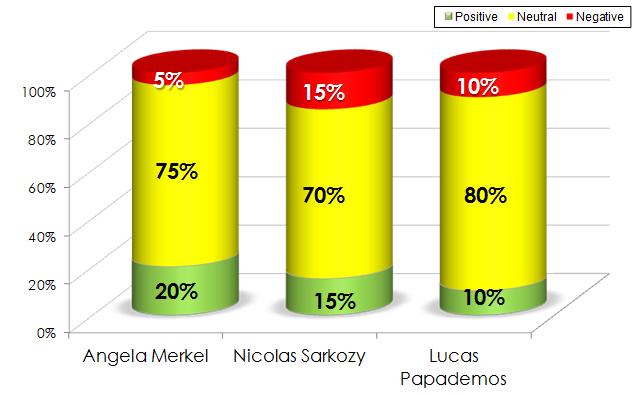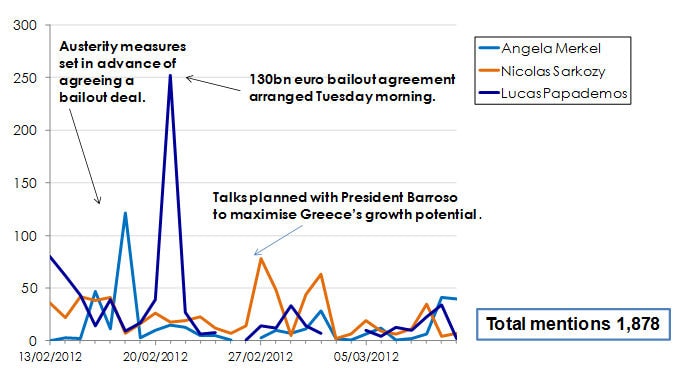The economic crisis in Greece has been dominating recent financial news, with three Euro leaders, German chancellor Angela Merkel, French president Nicolas Sarkozy, and Greek prime minister Lucas Papademos, in many headlines. Last week, the Eurozone finance ministers signed off on a second Greek bailout package, after many arguments and fears that the bailout program was in danger of disintegrating.
Volume of mentions

Source: Echo Sonar, Greece-Euro Crisis: UK Online Media Analysis
Analysing online media coverage of Merkel, Papademos and Sarkozy shows that Papademos has the lion’s share of mentions (41 per cent), with Merkel not far behind (36 per cent). Sarkozy was the least prominent of the European leaders, with reporting often focusing on his re-election campaign in France, and his difference of opinion with David Cameron over the future stability of Europe. Generally the media was neutral in its coverage of the three heads, although Merkel scores highest for positive coverage and lowest for negative mentions.
Tonality

Source: Echo Sonar, Greece-Euro Crisis: UK Online Media Analysis
Looking at the content of the coverage, key stories included:
-
Greeks shifting focus from debt to politics – opposition leader Antonis Samaras hinted at an early election: “In remarks that could unnerve Brussels, Samaras hit out at the austerity measures demanded by the EU and the International Monetary Fund, saying: ‘To make the debt cut work, we voted for things we disagree with.' " (Guardian.co.uk, 11 March)
- The EU closing a deal to secure the Greek bailout. Papademos featured heavily in reporting, describing the deal as an “historic day for the Greek economy.” (Financial Times, 21 February)
- Midway through February, Merkel was instrumental in forging an agreement with Greece: “Angela Merkel optimistic Greek bailout can be agreed next week,” headlined the Independent (17 February)
Volume of mentions

Source: Echo Sonar, Greece-Euro Crisis: UK Online Media Analysis
Discussing how the Greek economic crisis has been covered in the media, Tom Leatherbarrow, head of business-to-business at agency Willoughby PR, says that Greece is the most visible example of the new economic reality in which world leaders are increasingly powerless in the face of events. He adds: “A series of summits with little or no agreement have been, in effect, PR exercises to give the illusion of power and a co-ordinated response, when in reality, little power or co-ordination exists. What is troubling is that there is nobody showing leadership of the type that US president Franklin D Roosevelt displayed during the Great Depression or, dare I say it, that our previous prime minister Gordon Brown displayed at the G20 Summit in April 2009.”
Methodology
PRmoment asked Echo Sonar to analyse UK online media coverage regarding the Euro crisis in Greece. Research primarily focuses on Angela Merkel, Nicolas Sarkozy and Lucas Papademos. The research period was 13 February to 12 March 2012. Metrics included volume charts and tonality.
PRmoment Leaders
PRmoment Leaders is our new subscription-based learning programme and community, built by PRmoment specifically for the next generation of PR and communications leaders to learn, network, and lead.
PRmoment LeadersIf you enjoyed this article, sign up for free to our twice weekly editorial alert.
We have six email alerts in total - covering ESG, internal comms, PR jobs and events. Enter your email address below to find out more:








